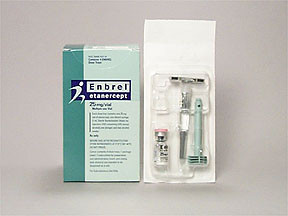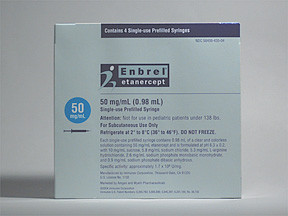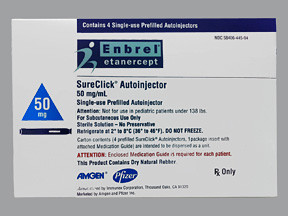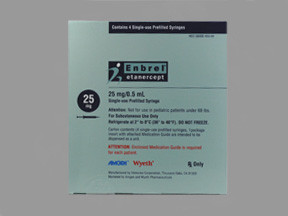ETANERCEPT - INJECTION
PHONETIC PRONUNCIATION: (ee-TAN-er-sept)
COMMON BRAND NAME(S): Enbrel
GENERIC NAME(S): etanercept
Uses
USES: This medication is used alone or in combination with an immunosuppressant (such as methotrexate) to treat certain types of arthritis (such as rheumatoid, psoriatic, juvenile idiopathic, and ankylosing spondylitis). Some brands of this medication are also used to treat a skin condition called psoriasis. These conditions are caused by an overactive immune system (autoimmune disease). The immune system attacks the body's own healthy cells, causing inflammation in the joints and skin. Etanercept controls your body's defensive response by blocking the action of a certain natural substance (TNF) that is used by the immune system. Treatment decreases redness, itching and scaly patches in psoriasis as well as the pain, swelling and stiffness of joints in arthritis. This medication can stop the progression of disease and joint damage, resulting in improved daily functioning and quality of life. This medication treats but does not cure autoimmune diseases. Symptoms usually return within 1 month of stopping the medication.
How to use ETANERCEPT - INJECTION
HOW TO USE: Read the Medication Guide and Instructions for Use provided by your pharmacist before you start using this drug and each time you get a refill. If you have any questions, ask your doctor or pharmacist. Inject this medication under the skin of the thigh, abdomen, or upper arm as directed by your doctor, usually once or twice a week. The dosage is based on your medical condition and response to treatment. Children's dosage is also based on weight. Do not change your dose without consulting your doctor. Use this medication regularly to get the most benefit from it. To help you remember, use it on the same day(s) each week. If you are using this medication at home, learn all preparation and usage instructions from your health care professional and the product package. Your doctor may give your first injection in the medical office. If your medication has been refrigerated, leave it at room temperature for at least 15 to 30 minutes before injecting. Do not warm up this medication any other way. For example, do not heat it in the microwave or place it in hot water. Do not shake this medication. Before using, check this product visually for particles, cloudiness, or discoloration. The prefilled syringe, cartridge, or pen injector may have small white particles in the liquid. This is normal. If you see other particles, cloudiness, or discoloration, do not use the liquid. Before injecting each dose, clean the injection site with rubbing alcohol. Change the injection site each time to lessen injury under the skin. Do not inject into areas that are sore, bruised, red, or hard. Learn how to store and discard medical supplies safely. You may notice improvement in your condition after 1 to 2 weeks, but it may take a few months to get the full benefit of this medication. Tell your doctor if your condition does not get better or if it gets worse.
Side Effects
Precautions
Interactions
Overdose
Images
Reviews
Faq for ETANERCEPT - INJECTION
Etanercept is a medication used to treat various inflammatory conditions such as rheumatoid arthritis, psoriasis, psoriatic arthritis, and ankylosing spondylitis. It belongs to a class of drugs called tumor necrosis factor (TNF) inhibitors.
Etanercept is administered by injection. It is available as a prefilled syringe or an autoinjector that patients can self-administer at home.
The frequency of Etanercept injections depends on the condition being treated. Typically, it is taken once or twice a week for rheumatoid arthritis and once a week for other conditions.
The effects of Etanercept may vary from person to person. Some individuals may experience improvement within a few weeks, while others may take several months to notice a difference.
Like any medication, Etanercept may cause side effects. Common ones include injection site reactions, headaches, nausea, and respiratory infections. Serious side effects are rare but may include serious infections and allergic reactions.
It is essential to inform your doctor about all the medications you are currently taking, including over-the-counter drugs and supplements. Some medications may interact with Etanercept, so your doctor can advise you on any adjustments needed.
Live vaccines should be avoided while using Etanercept because it can interfere with the body's immune response. It is recommended to consult with your doctor about the timing of vaccines or any specific concerns.
The duration of Etanercept treatment depends on the condition being treated and the individual's response to the drug. Some individuals may need long-term therapy, while others may be able to discontinue treatment after a certain period.
Moderate alcohol consumption is generally considered safe while on Etanercept. However, it is advisable to talk to your doctor regarding any specific concerns or potential interactions with other medications you may be taking.
Warning
WARNING: Because etanercept works by blocking the immune system, it may lower your ability to fight infections. This may make you more likely to get a serious (rarely fatal) infection (such as fungal infections, bacterial infections including tuberculosis) or make any infection you have worse. Tell your doctor your medical history, especially of past/recent/current infections. Also, tell your doctor if you have lived or traveled in areas where certain fungal infections (such as coccidioidomycosis, histoplasmosis) are common or if you have been near someone with tuberculosis. Areas where these types of fungal infections are commonly found include the Ohio and Mississippi River valleys and the southwestern United States. You should be tested for tuberculosis (TB skin test or chest X-ray) before and during treatment with etanercept. See Side Effects section for symptoms of infections to watch out for, and get medical help right away if you develop any of these symptoms. The immune system is also important in preventing and controlling cancer. Though it is very unlikely to happen, there is a risk (especially in children/teens/young adults) of developing cancer (such as lymphoma, skin) due to this medication or due to your medical condition. Discuss the risks and benefits of treatment with your doctor. Tell your doctor right away if you develop symptoms such as unusual lumps/growths, swollen or painful abdomen, unexplained weight loss, persistent fever or night sweats.
Disclaimer
IMPORTANT: HOW TO USE THIS INFORMATION: This is a summary and does NOT have all possible information about this product. This information does not assure that this product is safe, effective, or appropriate for you. This information is not individual medical advice and does not substitute for the advice of your health care professional. Always ask your health care professional for complete information about this product and your specific health needs.





No Reviews Yet